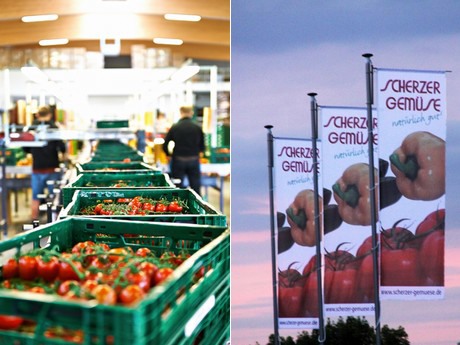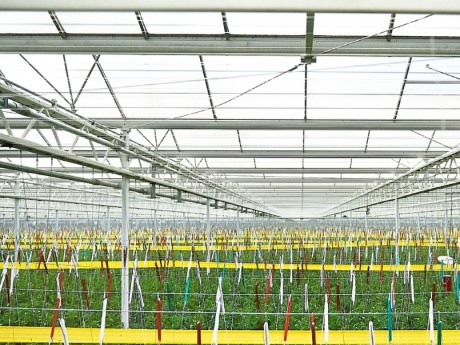In the greenhouse facility in Waldeck, a district of Dinkelsbühl, the Gemüse Scherzer family business is now harvesting tomatoes the fifth year. Dinkelsbühl's Lord Mayor Christoph Hammer made a company tour, also talking about "five years of tomatoes made in Dinkelsbühl".
In recent years, a lot has happened at Gemüse Scherzer. The greenhouse area has increased and since, 2019 mini cucumbers have been grown there in addition to the tomatoes. Several tomato varieties are grown in the Nuremberg greenhouse plant / Picture: Scherzer Gemüse GmbH
Several tomato varieties are grown in the Nuremberg greenhouse plant / Picture: Scherzer Gemüse GmbH
"In 2014, we added 3.5 hectares, so that we now have a total greenhouse area of 10.5 hectares," said Stefan Scherzer, who is now managing the company together with his father Peter. When asked how the Dinkelsbühl company was doing, Scherzer answered honestly: "Sales of tomatoes were difficult last year. We produced too much and the prices were not good. We live on the regional market and you always have to keep an eye on it. Every year is different, but basically we were satisfied, these five years."
Environmentally friendly cultivation
Scherzer Gemüse employs around 55 people, and during the main harvest season it almost goes up to 100. These include harvest workers, office workers, temporary staff for the technical sector and part-time staff for packaging. The philosophy of Scherzer Gemüse is to grow fresh vegetables of the highest quality, while respecting organic crop protection. The company grows its produce soil-free and the plants are nursed automatically by computers. This has the advantage that pests can be controlled more optimally.
Excess heat from biomass generation plant TEAtherm is used to heat the greenhouse system. "In our power plant, only renewable fuels from landscape conservation are used, which means sustainably produced electricity. The by-product of power generation is heat, most of which comes from Scherzer vegetables. The remaining heat is supplied to surrounding companies, residential buildings and a larger hotel complex via the district heating network of Stadtwerke Dinkelsbühl," said managing director of TEAtherm, Jakob Friedrich.
 View into the greenhouse / Image: Scherzer Gemüse GmbH
View into the greenhouse / Image: Scherzer Gemüse GmbH
Hygiene measures
In order to get people excited about their vegetables, Scherzer offers vegetable tours. In summer, these take place almost every day and people will sometimes travel 100 kilometers to visit. "We want to present ourselves in a good light and let in anyone who is interested. The only important thing is that the measures regarding hygiene are always adhered to," said Stefan Scherzer.
Lord Mayor Dr. Christoph Hammer is pleased about the positive response of the citizens. "The Dinkelsbühlers are very proud to have this company in their neighborhood. The products are, so to speak, "their" tomatoes." The company uses its own trucks and vans to supply food retailers such as AEZ, EDEKA, Kaiser's Tengelmann and NORMA.
For more information:
Scherzer Gemüse GmbH
Kriegerlindenstr. 3
90427 Nürnberg
Tel.: 0911-310 466 0
Fax: 0911-310 466 90
E-Mail: info@scherzer-gemuese.de
www.scherzer-gemuese.de
